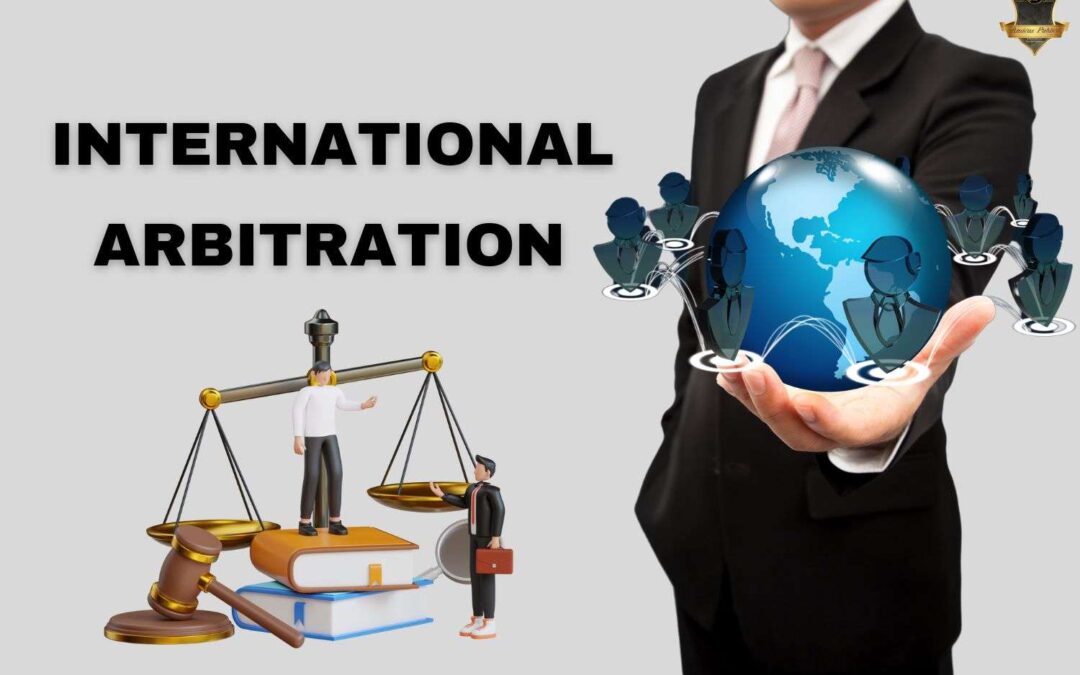ABSTRACT
Usually disputes between the parties take too much time to settle. With loss of time the parties also suffer loss of finance occurred due to complex and long-stretched battle between the parties. Without a doubt it can be said that court proceedings are lengthy and complex and generally settle the disputes taking lots of time, thus the best solutions for the parties are to adopt the mechanism of Alternate dispute resolution.
Due to globalisation the trade with international borders has extended extensively, and where there is trade there is a scope of dispute. Thus, to resolve the dispute arising internationally the parties can adopt the method of international arbitration.
INTRODUCTION
International arbitration is a conflict resolution process that works similarly to domestic court litigation, except it happens outside of a nation’s boundaries and is handled by private adjudicators known as “arbitrators.” It is a more rapid and consensual form of conflict resolution process. It is impartial, binding, and enforceable. It makes it easier for parties with different legal, linguistic, and cultural backgrounds to get together and settle their differences.
The international arbitration clause is vital in any contract for the business dealing in cross-border transactions. These clauses reflect great attention to the arbitral institution, seat of arbitration, law by which the arbitration is to be governed, language of the proceedings, enforcement of arbitral awards across various jurisdictions, etc.
DEFINITION OF INTERNATIONAL ARBITRATION
The whole process of arbitration is being governed by the Arbitration and Conciliation Act, 1966. The main purpose for the enactment of this act is to provide speedy, less costly and effective dispute resolution. This process is prevalent in both domestic and international domain and both areas are governed by this act.
The definition of International commercial arbitration is also provided under the Arbitration and Conciliation Act, 1966 under section 2 (1) (f). It states that “international commercial arbitration” means an arbitration relating to disputes arising out of legal relationships, whether contractual or not, considered as commercial under the law in force in India and where at least one of the parties is—
- an individual who is a national of, or habitually resident in, any country other than India; or
- a body corporate which is incorporated in any country other than India; or
- an association or a body of individuals whose central management and control is exercised in any country other than India; or
- the Government of a foreign country”
CONVENTIONS GOVERNING INTERNATIONAL ARBITRATION
There are many international conventions governing the international arbitration, some of them are –
- The Geneva Convention: The Geneva Convention for the Execution of Foreign Arbitral Awards (1927) and the Geneva Protocol on Arbitration Clauses in Commercial Matters (1923) were the conventions governing the international Arbitration. The Protocol obligated the signatory countries to submit agreements to arbitration and legally recognized international commercial arbitration agreements. The Convention mandated that the parties to the agreement recognize arbitral awards made in other parties’ countries. However, the convention’s efficacy was undermined by the aftermath of World War II.
- New York Convention: The New York Convention was adopted by The United Nations Convention on the Recognition and Enforcement of Foreign Arbitral Awards in the year 1958. The main purpose of this convention was to provide the uniform rules related to recognising and enforcing the foreign arbitral awards by the national courts and recognising the international commercial arbitration.
INTERNATIONAL CHAMBERS OF COMMERCE
Founded in 1919 in Paris, the International Chamber of Commerce (ICC) is a key organization for international commerce, promoting trade and investment across borders. It actively collaborates with international organizations, governments, and other stakeholders to develop laws and policies that support international trade.
The International Court of Arbitration (ICA), a body founded in 1923, is one of its noteworthy innovations. It handles the arbitration process for resolving issues involving international commerce. The International Chamber of Commerce Rules of Arbitration are a collection of guidelines for international arbitration that are established by it and are updated on a regular basis.
Several powers of International Court of Arbitration are –
- Monitor the arbitral process in order to ensure the efficiency.
- It verifies the validity and enforceability of the arbitration ruling by reviewing and approving it.
- Make decisions about arbitration cost.
ENFORCEMENT OF FOREIGN ARBITRAL AWARDS
The process of international commercial arbitration is somewhat similar to the domestic arbitration. The main concern is about the enforcement of foreign award.
Arbitration and Conciliation Act, 1966 provides for the enforcement of foreign awards. Part II of the Act includes the awards from New York Convention and Geneva Convention. Section 44 of the Act defines the foreign arbitral award under the New York Convention as disagreements between the parties resulting from their legal connections. As per section 53 of the Act, the Geneva Convention defines foreign awards as disagreements between the parties resulting from business affairs.
As per section 46 of the Act, under New York Convention it has been provided that the foreign award which is enforceable under this chapter shall be treated as binding. Section 47 of the Act states that the party who is applying for the enforcement of a foreign award shall produce before the court the following documents that is –
- the original award or a copy thereof, duly authenticated in the manner required by the law of the country in which it was made;
- the original agreement for arbitration or a duly certified copy thereof; and
- such evidence as may be necessary to prove that the award is a foreign award.
As per section 49 of the Act, when the court is satisfied that the foreign award is enforceable the award shall be deemed to be a decree of the court.
The same process for enforcement of foreign arbitral award is mentioned under the Geneva Convention awards.
CONCLUSION
A fast-growing economy needs a reliable, dispute resolution process. Due to the overwhelming backlog of cases that Indian courts are now handling, business entities, both domestically and internationally, have demonstrated a strong preference for arbitrating disputes.
International Commercial Arbitration is a quicker and more affordable way to settle international conflicts that result from business dealings. It deals with the complex issues like cultural differences, institutional rules, etc. International arbitration provisions help to meet the specific requirements of every agreement, acting as essential shields against future disputes and promoting stability and clarity in cross-border commercial relations.

